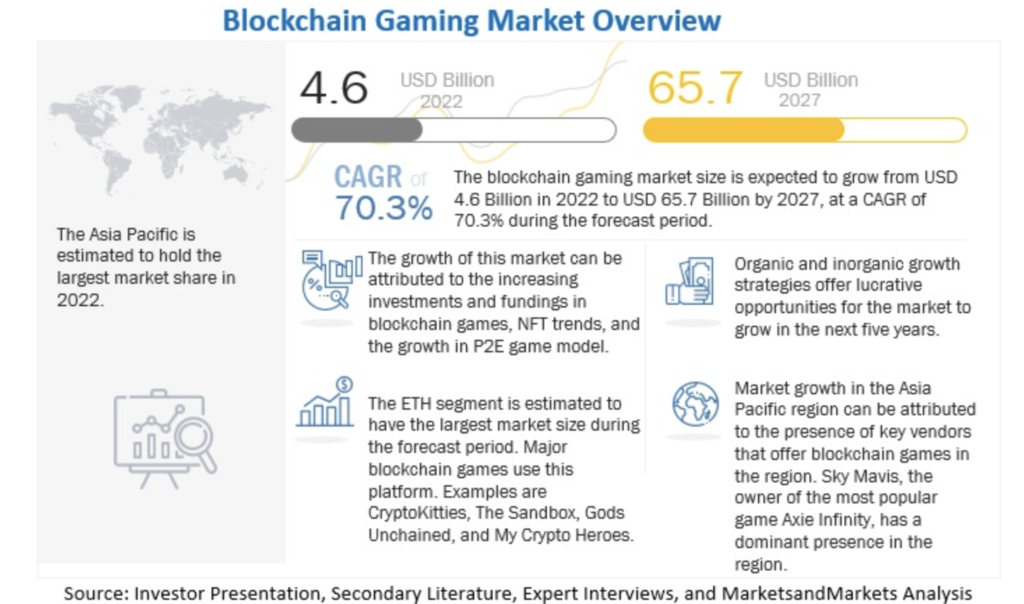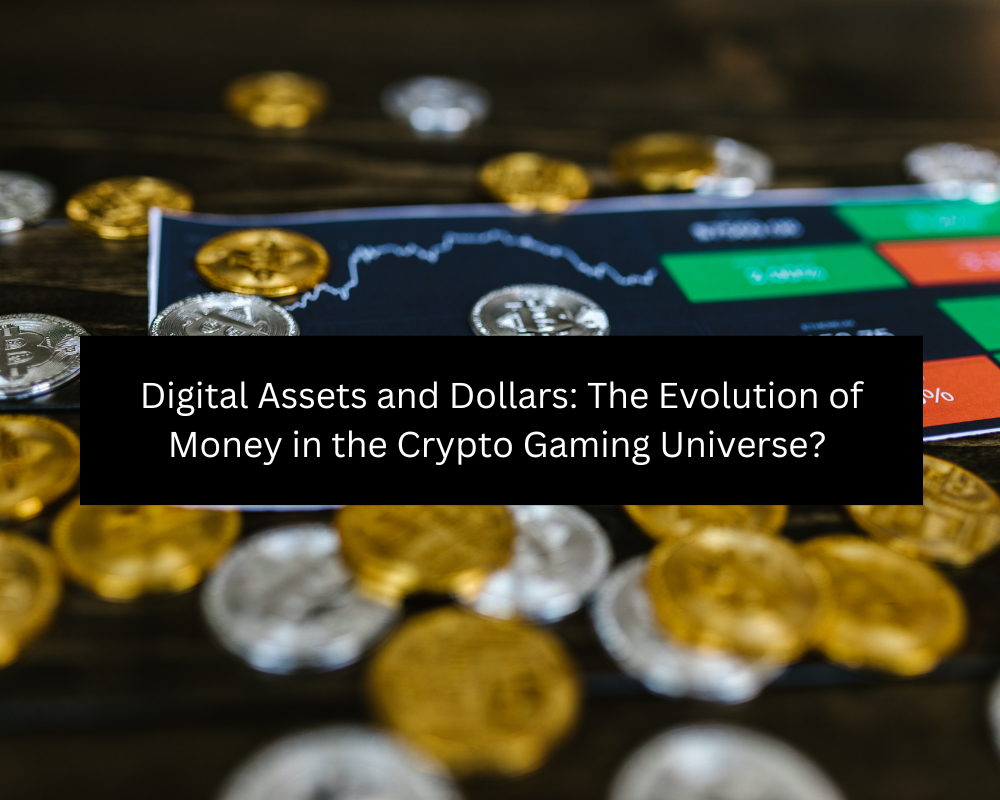Every year, the gaming industry continues to evolve and become more dynamic, leading to enhanced gameplay experience for gamers worldwide. In recent years, another technological advancement has completely revolutionized the gaming industry. This development is not related to enhanced graphics but the inclusion of digital currencies as a new paradigm shift.
Cryptocurrencies or digital currencies are developed on blockchain technology and refer to tokens such as Bitcoin, Ethereum, Dogecoin, etc., These digital currencies are built on a blockchain network that is immutable and secure. While cryptocurrencies in themselves are largely focused on developing a decentralized financial ecosystem, another use case developed on blockchain technology has a bigger impact on the gaming universe.
NFTs are tokenized assets developed on blockchain technology that can be integrated with in-game assets to monetize these assets, creating a plethora of monetary advantages. In this blog, we will take a look at the evolution of cryptocurrencies in video games and the effect of NFTs and decentralized finance (DeFi) on the gaming universe.
The evolution of Cryptocurrencies in Video Games
The integration of cryptocurrencies within video games marked a significant development in the gaming universe and pivoted the future of gaming to a much more rewarding and engaging universe for gamers. Here is how cryptocurrencies directly play a role in video games.
In-Game Purchases
One of the most obvious ways in which cryptocurrencies influence the gaming universe is through in-game purchases. Cryptocurrencies allow gamers to buy virtual items such as character skins, in-game currencies, weapon upgrades, and more. Digital currency transactions are quick, and secure and require low transaction fees, making it a great choice for microtransactions within the games. These digital currencies help in enhancing the overall gaming experience for gamers.
Additionally, cryptocurrencies simplify cross-border transactions as they do not rely on centralized institutions to approve and facilitate transactions. Players can simply make transactions from any corner of the world using crypto tokens.
Cryptocurrency-based Rewards and Loyalty Programs
Cryptocurrencies also enable in-game rewards and loyalty programs and help developers and publishers to incentivize participation in their in-game activities. New achievements, participation in tournaments, and interaction within the game can be monetized with crypto-based rewards and loyalty programs for player retention and game promotion.
Apart from being a marketing tactic, in-game rewards also help create a sense of ownership for the gamers, boosting contribution and engagement within the game for an interactive gaming experience. Additionally, these rewards can be used in broader contexts, such as trading in-game assets in a marketplace or trading using these assets.
Use of Blockchain Technology for Item Ownership and Trading
The adoption of cryptocurrencies within the gaming universe also helps boost ownership of in-game assets that can be traded using the help of NFTs or tokenized in-game assets. By earning or winning in-game assets, players can create passive income sources by trading or selling these assets as NFTs on gaming marketplaces.
Let’s take a closer look at the role of NFTs in the gaming universe.
Tokenization of In-Game Assets
One of the most revolutionary aspects of integrating crypto into the gaming universe is the tokenization of in-game assets with the help of NFTs. NFTs have marked a significant shift in the way gamers can interact with games by trading and monetizing their in-game assets.
NFTs and their Significance
NFTs are a digital token that signifies the ownership of unique items that can be in-game assets in the gaming industry. However, their value lies in different industries with the potential to tokenize any digital artwork, a collectible item, or even real estate. NFTs are non-fungible, which means every token is unique and cannot be exchanged on a one-to-one basis with other NFTs. This uniqueness is because of blockchain technology that ensures the scarcity and provenance of all NFTs.
Tradable In-Game Assets
Several gaming projects have already integrated their ecosystem with tokenized in-game assets, helping players to own these assets which mimic real-world ownership. While these NFTs and in-game assets do not exist in the real world, they can be virtually traded on a gaming marketplace for crypto tokens or NFTs, that can be converted to fiat currencies.
Here is how the tokenization of in-game assets works:
- The in-game assets are registered on a blockchain network as NFTs by generating a unique token with metadata and information about the asset.
- The players can earn these assets, whose ownership is verified by blockchain technology as NFTs. On acquisition, the transaction records are registered on the blockchain network, making them immutable and easily transferable.
- Gamers can buy, sell, or trade these NFTs and in-game assets on an NFT marketplace, successfully monetizing their achievements.
Decentralized Gaming Platforms
It is clear how NFTs are transforming the gaming universe. This transformation has led to the birth of a variety of decentralized gaming platforms ushering in a new era of rewards for gamers. This integration has reshaped the development of games, creating a much more fruitful experience for gamers.
Decentralized gaming platforms are built on blockchain technology which helps ensure decentralization, security, and transparency of the games. Unlike centralized platforms, decentralized gaming platforms transfer the power and control over the game’s rules, governance, and economy to the community of players.
Smart contracts play a huge role in the execution of NFTs, as they automate actions upon completion of predefined rules, eliminating the need for intermediaries. These contracts enable in-game transactions, asset ownership, and other elements in gameplay fairly and securely. For instance, on completion of a mission, the adjacent rewards are automatically transferred to the digital wallet of the gamer. Let’s take a further look at how decentralized gaming platforms are transforming the gaming universe.
Player Ownership and Governance
A decentralized gaming platform enables true ownership of in-game assets and allows players to have a vote in the operation of the platform using a decentralized autonomous organization or DAO. A DAO helps stake owners of in-game assets owners to utilize their assets in order to have a say in the future of an organization and earn passive income by staking their NFTs.
Transparency
Blockchain is a completely immutable and transparent ledger that ensures all transactions related to in-game assets are visible to all the participants while ensuring anonymity. A blockchain network stores information such as wallet addresses with complete transaction records while omitting any personal information to enhance the transparency and privacy of the players.
Anti-Cheating Mechanisms
Smart contracts are beneficial in enforcing game rules automatically while preventing fraud and cheating. All the rules are applied constantly for every player, ensuring fairness and eliminating the frustration caused by hackers and cheaters in traditional gaming ecosystems.
Security is paramount in all transactions, especially in the gaming universe where some notorious factors can exploit the shortcomings of a platform. Let’s take a further look at how decentralized gaming platforms, cryptocurrencies, and NFTs can help mitigate these risks.
Security and Fraud Preventions Using Cryptocurrencies
Integration of blockchain and cryptocurrencies in the gaming universe has helped address several shortcomings of the traditional gaming ecosystem, ensuring security and fraud prevention. Here is how the integration of cryptocurrencies can enhance the security of a gaming platform.
Immutable Transaction Records:
Blockchain technology helps record all in-game transactions on an immutable ledger. This ledger prevents alteration or deletion of any transactions, once it is recorded on the network, ensuring the authenticity of the transactions. These records are tamper-proof and transparent and help ensure secure proof of all in-game transactions, making it difficult for anyone to interfere, manipulate, or dispute any records.
Secure Ownership
NFTs promote secure ownership of in-game assets as they come with cryptographic proof of ownership, which helps to reduce the risk of theft or fraudulent sales of assets. These properties of NFTs and blockchain technology help protect players and provide an easy way to recover assets in case of thefts, as the ownership of the assets is immutable.
Smart Contracts
Smart contracts are self-executable codes that help in the automatic reinforcement of the rules of the games. A game developer can predefine requirements, which when fulfilled will release in-game rewards for the players. Additionally, these contracts level the playing field by offering the same rewards to every player and ensuring all in-game actions, reward distributions, and transactions adhere to the rules defined by the developer. Rule violation and cheating become difficult in this scenario as the players will not receive any rewards unless the rules are followed.
Challenges in the Integration of Cryptocurrencies Within the Gaming Ecosystem
While cryptocurrencies and blockchain technology hold immense potential, it has challenges, which need to be addressed before a global integration.
Here are some of these challenges:
Regulatory Uncertainty
One of the biggest challenges hampering global acceptance and integration is the lack of clear regulations for the use of cryptocurrencies and NFTs in the gaming industries. While various countries are listing regulations for the use of cryptocurrencies, they are mostly related to direct investment and trading of digital assets. There is still a level of ambiguity when it comes to addressing the use of NFTs and cryptocurrencies in the gaming universe.
Additionally, as the cryptocurrencies are volatile, the price of these tokens is directly affected by the regulatory changes, causing a shift in the value of NFTs assigned with in-game assets. This complicates navigating through digital assets for gamers, causing hesitation in mass integration.
However, with time, the majority of centralized organizations are setting regulations for the use of digital currencies. With time, these regulations will be enforced, leading to standardization globally.
Environmental Concerns
Blockchain technology is energy-intensive and requires heavy setups and operations to record transactions on a blockchain network. While this makes it difficult for hackers to manipulate these records, it also uses extensive energy, causing environmental concerns. The majority of crypto mining operations utilize coal-based energy sources, which leaves a massive carbon footprint, causing concern about the viability of digital assets.
However, gradually these operations are shifting towards renewable sources of energy such as hydro energy, wind energy, and solar energy, mitigating these concerns, and making cryptocurrency mining sustainable.
Read: 6 Money Tips To Keep Your Family Financially Safe During Uncertain Times
Security Vulnerabilities
Blockchain technology has safeguarded the privacy and security of the users, it is not fool-proof. Blockchain technology and smart contracts have vulnerabilities that have been exploited in the past facilitating fraud and theft in blockchain-based games.
However, as technology advances, these risks are being addressed and several security measures are being deployed such as double factor authentication, KYC, security audits, etc., to ensure the safety of all users.
Scams and Rug Pulls
In the past, the cryptocurrency ecosystem has been plagued with scam projects, which vanished with users’ funds, causing significant losses. Earlier, major cryptocurrency platforms were unregulated and relied solely on verification and audits from third parties, leading to thefts and scams.
However, as centralized organizations regulate the use of cryptocurrencies, strict rules are being enforced, which will help in establishing global standards and limiting such frauds and scams.
Future of Cryptocurrencies in the Gaming Universe
While there are several kinks that needs to be ironed out, the potential of cryptocurrencies in revolutionizing the gaming universe is irrefutable. There are various decentralized gaming projects popular among global players that have helped them earn significant monetary streams while helping them establish a career in doing what they love.
The blockchain gaming market has already exceeded the $4.6B mark in 2022 and is poised to cross the $65B mark by the end of 2027.

Moreover, innovative new projects such as Project Lambo, are taking the use of cryptocurrencies a step further by integrating the latest technologies, such as AI, AR, VR, and NFTs, with the gaming universe. Project Lambo is a pioneering gaming ecosystem that boasts an intriguing storyline and compelling gameplay designed to offer gamers an immersive universe where they can explore the virtual world of Sheertopia.
Additionally, Project Lambo has integrated learning with gaming and cryptocurrencies by designing a Sheertopian academy where players can learn and educate themselves in different fields while enjoying the interactive world of the Project Lambo ecosystem powered by NFTs and AR. It is safe to say, the future of cryptocurrencies and the gaming universe will be a rewarding one.
Conclusion
Cryptocurrencies and NFTs are undeniably an integral part of the gaming universe with the potential to create a more rewarding, safe, and interactive space for players. By merging global boundaries, safeguarding against fraudulent activities, and offering a truly rewarding space to earn real money, blockchain technology will ultimately establish a new era of gaming.
Author’s Bio:
Nia is a creative powerhouse with a degree in writing who thrives in entrepreneurship and marketing. She has a penchant for working on cryptocurrency projects, such as RPG NFT games, Blockchain games, and virtual games. Nia is a genuine fan of creativity and invention who likes to tell stories.



